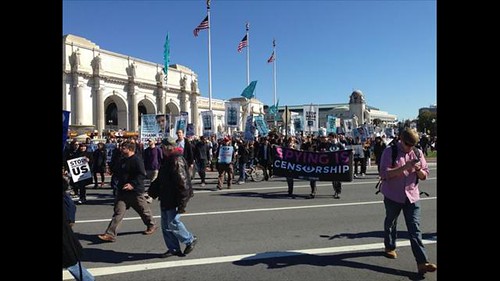
Thousands demonstrated against the National Security Agency and spying by the United States government in Washington, D.C. The event was held on Sat., October 26, 2013, a photo by Pan-African News Wire File Photos on Flickr.
Indonesia Warns Spy Claims Hurt Australian Ties
By Jason Scott and Yudith Ho - Nov 18, 2013
Prime Minister Tony Abbott said he won’t apologize as Indonesian President Susilo Bambang Yudhoyono recalled his envoy from Canberra and warned of damaged ties after media reports that Australian spies tried to tap his phone.
“Australia should not be expected to apologize for the steps we take to defend this country,” Abbott told parliament in Canberra today. He said he regretted any embarrassment to Yudhoyono, while defending security measures implemented by past governments.
Yudhoyono brushed off earlier efforts to defuse tensions, saying last night on his official Twitter feed that he will review areas of cooperation with Australia and is awaiting an official response to the spying reports.
“I also regret the Australian prime minister’s statement that downplays the tapping on Indonesia without a sense of remorse,” Yudhoyono said. “The U.S. and Australia’s action really hurts the strategic partnership with Indonesia.”
Yudhoyono’s mobile phone activity was tracked for 15 days in August 2009, the Australian Broadcasting Corp. said on its website yesterday, citing documents leaked by U.S. whistle blower Edward Snowden. At least once, intelligence agencies tried to listen to a conversation although the call lasted less than a minute and couldn’t be tapped, it said.
The claims could complicate Abbott’s bid for a free-trade agreement with Australia’s neighbor, with whom two-way trade reached A$14.6 billion ($13.7 billion) last year. The Abbott government, elected two months ago, is seeking Jakarta’s help to stop asylum seekers attempting to reach Australia by boat.
‘Being Naive’
“We’re being naive if we think nations don’t spy on each other but it’s never nice to be caught out,” said Zareh Ghazarian, a political analyst at Melbourne’s Monash University. “It will frustrate both governments and could lead to Indonesia taking a more hard line on bilateral negotiations.”
Indonesia, which has the world’s largest population of Muslims, is recalling its ambassador from Canberra for talks, Yudhoyono said on Twitter yesterday. “This is a stern diplomatic step.”
“It is nothing less than an unfriendly act which is having already a very serious impact on our bilateral relations,” Foreign Minister Marty Natalegawa told reporters in Jakarta yesterday. “It’s not a smart thing to do. It violates every single decent and legal instrument that I can think of.”
The relationship between the two nations, often fractious since World War II, has improved under Yudhoyono’s leadership, although he can’t run for a third term in elections due next year. “It’s in no one’s interests to do anything or to say anything that would jeopardize that relationship, and certainly I’m not going to,” Abbott told reporters earlier today.
Respecting Friendship
The Indonesian government had done the right thing in recalling its envoy, and should have also sent Australia’s ambassador home, said Tjahjo Kumolo, secretary-general of the Indonesian Democratic Party of Struggle, or PDI-P, the country’s biggest opposition party, in a mobile-phone message today.
“We need to be brave to show that Indonesia is a sovereign country, a country that’s free and active and guards and respects the ethics of friendship among countries,” said Kumolo, who is a member of a parliamentary commission which oversees foreign affairs.
Indonesia will review cooperation on information exchange with Australia, Djoko Suyanto, coordinating minister for politics, law and security, said yesterday in a mobile-phone message to reporters. That includes the assignments of Australian officials stationed in that country’s embassy in Jakarta, he said.
U.S.-led Network
Australian officials actively sought a long-term strategy to monitor Yudhoyono’s mobile-phone activity, the ABC said yesterday. Other Indonesian officials targeted include former Vice President Jusuf Kalla and the security and information ministers, plus Yudhoyono’s wife, the ABC said.
The Sydney Morning Herald reported Oct. 31 that Australian embassies are helping intercept phone calls and data across Asia as part of a U.S.-led global spying network, citing information from Snowden and a former Australian intelligence officer.
“The public in Indonesia is concerned about this,” Vice President Boediono, who the ABC said was also targeted, said in a speech in Canberra last week. “I think we must look to come to some arrangement that guarantees intelligence information from each side is not used against the other.”
To contact the reporters on this story: Jason Scott in Canberra at jscott14@bloomberg.net; Yudith Ho in Jakarta at yho35@bloomberg.net
To contact the editor responsible for this story: Rosalind Mathieson at rmathieson3@bloomberg.net
No comments:
Post a Comment